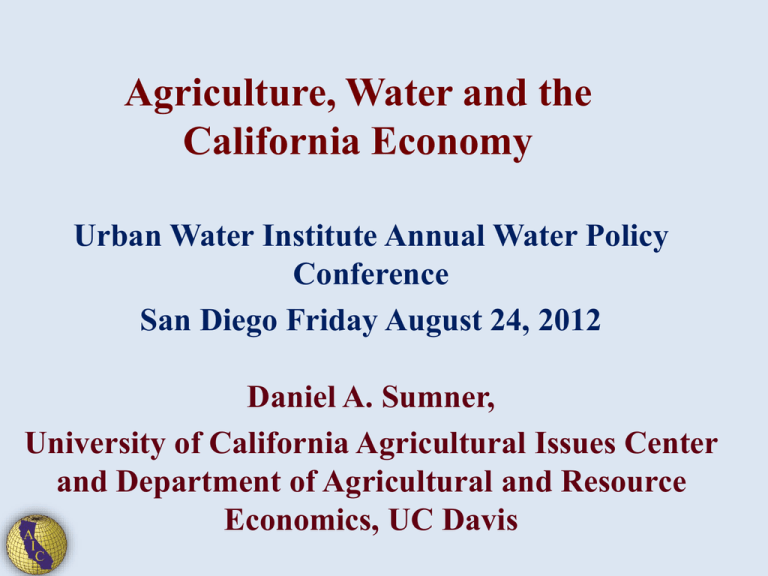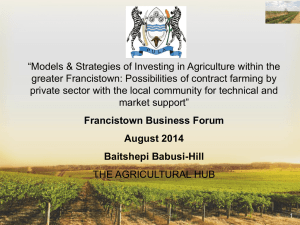Daniel A. Sumner – Agriculture, Water and the California Economy
advertisement

Agriculture, Water and the California Economy Urban Water Institute Annual Water Policy Conference San Diego Friday August 24, 2012 Daniel A. Sumner, University of California Agricultural Issues Center and Department of Agricultural and Resource Economics, UC Davis California has a variety of climate and land use zones • Natural diversity allows diverse agriculture to thrive • A relatively small share of the total land mass is suitable for highproductivity irrigated crops California agricultural land use Cropland, pastured 3% Other cropland 4% Cropland, harvested 30% Pasture and rangeland 52% Other land 6% Forest land 5% Total agricultural area is 25.37 million acres California 2010 cash receipts and acreage, by commodity grouping Cash receipts Grains and cotton 9% Nursery/green house 10% Vegetables and melons 19% Tree nuts 14% Acreage Dairy 16% Hay and forage crops 19% Other livestock 10% Grains and cotton 38% Fruits 15% Fruits 23% Nursery/green house 0.004% Vegetables and melons 9% Tree nuts 13% Crop revenue per acre • Higher where fresh vegetables, berries, high-priced wine grapes and fruits predominate along the central and southern coast • Lower where field crops predominate in the in the Sacramento Valley and southern deserts, Top 20 California Commodities by Value, 2010 The top 20 commodities accounted for $30 billion of $37.5 billion in total sales. California value of agricultural exports in 2010 Total CA agricultural export value: $14.7 billion Value by Commodity Group Wine 7% Other products and Animal Products mixtures 10% 13% Vegetables 7% Tree Nuts 27% Value by Destination Australia Field Crops 1% 16% India 2% Rest of World 20% Canada 23% Taiwan, 2% United Arab Emirates, 3% Fruits 20% European Union-27* 18% South Korea 5% Mexico 6% Japan 9% China / Hong Kong 11% California precipitation map California’s water system is characterized by an asynchrony of water availability and demand in space and time: • Availability peaks in winter in the sparsely populated north • Demand peaks in summer in the Central Valley (ag) and South Coast (urban) Agricultural cash receipts per acre-foot of applied water, California, in year 2005 dollars Year-2005 inflation adjusted dollars per acre foot applied water 1,400 1,200 1,000 800 600 400 200 0 1960 1972 1980 1985 1992 2000 2005 Agricultural production value per acre-foot of applied water, California, 2005 Real (2005) value of California crops and livestock, 1967-2010 25,000 20,000 Field Crops Million dollars (2005=100) All Other Crops Livestock and Poultry 15,000 10,000 5,000 0 1967 1977 1987 1997 2007 2010 Index of California harvested acreage and real crop receipts Indexed real prices of U.S. corn and wheat, 1866-2011 Index of real prices of California commodities, 1980-2011 Agricultural Production Share of GDP, 2007-2009 average Country United Kingdom Germany United States Japan California France Australia Mexico Brazil China India Agriculture's share of GDP % 0.7 0.9 1.1 1.5 1.4 2.0 2.5 3.9 5.9 10.6 17.9 California agriculture and economy, 2009 Direct Effects Industry Jobs Value output added ($ billion) Agricultural production and processing Agricultural processing Ag-support activities Farming Total California economy Total Effects Jobs Value added (1,000) ($ billion) (1,000) ($ billion) 147.0 589.8 42.6 1,323.2 98.3 6.6 40.9 197.6 187.2 194.7 20.5 5.2 16.4 3,223.3 19,857.0 1,874.6 657.9 227.5 424.2 112.0 64.4 8.8 35.6 California agriculture is more than farming and is liked to the rest of the economy • About 600 thousand direct jobs in production and processing and about 1.3 million including the ripple effects. • About $43 billion in direct GDP and about $112 billion including ripple effects. • Overall agriculture accounts for about 6% of the economic activity in California • Farming itself is more than half of that with fruit leading the way, but California farming has great diversity California farming and economy, 2009 Direct Effects Total Effects Industry Jobs Value Jobs Value output added added ($ billion) (1,000) ($ billion) (1,000) ($ billion) Farming Grains and oilseeds Vegetables and melons Fruit Tree nuts Greenhouse and nursery Other crops Beef cattle Dairy cattle and milk Poultry and eggs 40.9 1.3 8.0 11.8 3.7 4.0 4.0 1.7 4.5 1.3 194.7 16.2 29.0 48.4 29.2 21.2 13.8 8.6 20.6 1.6 16.4 0.5 3.6 5.5 1.9 2.0 1.2 0.3 1.0 0.2 424.2 22.7 84.5 147.7 57.8 45.1 38.7 16.1 40.9 6.9 35.6 1.0 7.7 12.1 3.8 4.0 3.1 0.9 2.8 0.7 Central Valley agriculture and economy, 2009 Direct Effects Industry Jobs Value output added ($ billion) Agricultural production and processing Agricultural processing Ag-support activities Farming Total Central Valley economy Total Effects Jobs Value added (1,000) ($ billion) (1,000) ($ billion) 65.5 293.3 19.3 636.7 46.6 38.0 3.7 23.4 68.7 114.0 108.8 7.0 2.8 9.4 252.8 137.6 259.0 21.6 4.7 19.5 395.5 2,889.9 224.1 Central Valley agriculture is large and diverse comprising a significant share of the whole economy • About 22% of Central Valley jobs are tied to agricultural production and processing, about 40% linked to farm processing • About 9% of GDP is tied directly to agriculture and this grows to about 21% when we include the ripple effects. • Fruit, tree nuts, vegetables and dairy are the big contributors to farm value added and employment. Central Valley farming and economy, 2009 Direct Effects Total Effects Industry Jobs Value Jobs Value output added added ($ billion) (1,000) ($ billion) (1,000) ($ billion) Farming Grains and oilseeds Vegetables and melons Fruit Tree nuts Greenhouse and nursery Other crops Beef cattle Dairy cattle and milk Poultry and eggs 23.4 1.2 3.1 8.1 3.5 0.7 1.0 1.0 3.9 0.5 108.8 14.5 7.9 26.8 28.1 2.3 3.4 5.2 17.4 0.5 9.4 0.5 1.4 3.7 1.8 0.4 0.3 0.1 0.8 0.1 259.0 21.3 32.1 105.3 60.2 6.5 10.3 10.0 35.4 2.7 19.5 0.9 2.9 8.0 3.6 0.7 0.7 0.5 2.1 0.3 Southern California agriculture and economy, 2009 Direct Effects Industry Jobs output ($ billion) Agricultural production and processing Agricultural processing Ag-support activities Farming Total Southern California economy Value added Total Effects Jobs Value added (1,000) ($ billion) (1,000) ($ billion) 49.6 157.6 13.1 458.6 41.8 39.0 1.1 9.2 79.1 30.8 44.5 8.4 0.9 3.6 297.9 39.6 111.4 30.4 1.7 9.2 1,793.1 11,550.5 1,064.6 Agriculture also contributes significantly to the Southern California economy • About 460 thousand jobs and $42 billion in GDP derived from agricultural production and processing when ripple effects are included • Farming in Southern California accounts for about a quarter of these totals in the region. • Greenhouse and nursery, fruit and vegetables are all major contributors. Southern California farming and economy, 2009 Direct Effects Total Effects Industry Jobs Value Jobs Value output added added ($ billion) (1,000) ($ billion) (1,000) ($ billion) Farming Vegetables and melons Fruit Greenhouse and nursery Other crops Beef cattle Dairy cattle and milk Poultry and eggs 9.2 2.1 1.6 2.1 2.1 0.4 0.4 0.3 44.5 9.6 9.8 12.2 6.5 1.5 1.9 0.4 3.6 1.0 0.7 1.1 0.6 0.1 0.1 0.0 111.4 28.2 26.3 29.1 23.1 3.8 4.5 1.6 9.2 2.4 1.9 2.5 1.9 0.3 0.3 0.2 Thank you, Dan Sumner aic.ucdavis.edu








